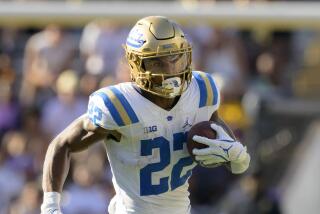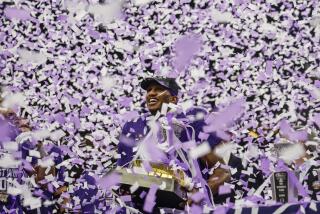Robinson Decides It’s Time to Cash Out
One of college football’s most successful coaches looked in the mirror this week and watched his lips form the dreaded words: It’s time to go.
It was not 77-year-old Joe Paterno, whose Penn State team has lost 28 games since the 2000 season.
It was not 74-year-old Bobby Bowden, whose Florida State squads have not gotten better with (the coach’s) age.
The man who didn’t want to call it quits -- but did anyway -- was 69-year-old John Robinson, who announced his retirement as Nevada Las Vegas coach effective at the end of this season.
Like many of his coaching decisions, Robinson made the right call.
Unlike some of his contemporaries, Robinson opted for a clean cut, sparing us a torturous, drawn-out conclusion.
The problem with Paterno and Bowden is that they sincerely see no good reasons for retiring -- even if outsiders might provide them with plenty.
Robinson had an all-you-can-eat buffet of issues, so many that the decision almost made itself after his UNLV team fell to 0-4 last week following an unseemly loss to Utah State.
Robinson could not fathom the thought of weeks of media speculation about his future in Las Vegas.
In the last couple of years, he has suffered a heart attack and been diagnosed with diabetes.
“There isn’t anything wrong with me other than I’ve got to manage myself if I want to stay alive,” Robinson said in a telephone interview from his office this week.
Linda, his wife, has undergone seven surgeries related to her battle with breast cancer and faces another today, although Robinson says the long-term prognosis is good.
“We feel like we’ve got to quiet down and get back to where we’re getting healthy again,” Robinson said.
This is not -- by any stretch of the imagination -- the way Robinson wants to end his career.
He came to the desert in late 1998 to resurrect a downtrodden program and maybe -- though Robinson would never admit it -- prove that USC made a mistake in firing him in 1997.
He couldn’t have scripted a better start. As USC was flailing away under Paul Hackett, Robinson inherited a UNLV program that had lost 16 consecutive games.
Two years later, UNLV defeated Arkansas in the Las Vegas Bowl to cap a season in which Robinson was named Mountain West Conference coach of the year.
Robinson, however, could not sustain success and UNLV has gone 15-24 since that magical 2000 run.
As it turned out, appropriately enough, Las Vegas was always going to be a crapshoot. Robinson scheduled hard and aimed high, hoping a few wins over top powers could slingshot his program back to prominence.
Last year, UNLV pulled off a shocking upset win at Wisconsin, but the team still finished 6-6.
Robinson had high expectations this year, yet key injuries coupled with losses to Tennessee, Wisconsin and Air Force quickly derailed the train.
There was no real excuse for Saturday’s home loss to Utah State, after which Robinson announced his impending retirement.
He said the defeat was not a “breaking point” but admitted dismay at his team’s “shockingly disappointing start.”
Barring a dramatic turnaround that leads to a bowl bid, Robinson will coach his last game Nov. 20 at San Diego State.
He can then rest, recuperate and reflect on what has been, by any objective reckoning, a fine career.
His record in 27 years as a coach at USC (two stints), the Los Angeles Rams (nine years) and UNLV (six years) stands at 209-146-4.
He won a share of the national title at USC in 1978 and owns an 8-1 bowl record -- 4-0 in the Rose Bowl.
Robinson is not the sentimental type, or bitter.
He said of USC under Pete Carroll: “They’re playing with vigor and enthusiasm and all that, that’s what I like. They’re fun to watch.”
Robinson said walking away is not going to be difficult.
“It’s not, no,” he said. “I’ve had as much fun coaching here as I’ve had anywhere else.”
Simply put?
“It’s time for someone else,” he said. “We built this thing. It’s a solid program from a program they were almost thinking of dropping.”
Orton Hears a Boo?
Indeed, Purdue quarterback Kyle Orton might hear a few jeers Saturday when his team plays Notre Dame in South Bend, Ind.
Orton admitted this week that he didn’t care too much for the Irish growing up in Altoona, Iowa.
“Notre Dame in the Midwest is kind of one of those schools where you either love them or hate them,” Orton said. “I just grew up hating them, I guess.”
This might be the biggest game of Orton’s career and is one of the biggest in recent Purdue memory.
Orton has put up amazing numbers -- 982 passing yards, 13 touchdown passes with no interceptions -- but he also has feasted on the lowly likes of Syracuse, Ball State and Illinois.
Purdue (3-0) leads the nation in scoring at 49.33 points a game but is winless in its last 13 trips to Notre Dame Stadium, scoring its last victory in 1974.
Keeping Hope Alive
Diabolical (forward) thinking: Last year, we postulated early the possibility that USC could finish No. 1 in both polls but finish third in the bowl championship series standings, which is exactly what happened.
To prevent a repeat of this embarrassment, officials tweaked the BCS formula to give more weight to the human polls.
Are there any scenarios that could embarrass the BCS this year?
Try this one: Two powerhouse one-loss teams, let’s say Oklahoma and Louisiana State, finish first and second in the BCS standings and play in the Orange Bowl for the national title.
Meanwhile, the Fiesta Bowl matches 11-0 Utah against 11-0 West Virginia, two schools from weaker conferences.
In the end, which team is the true national champion, the one-loss winner of the Orange Bowl or the unbeaten victor in the Fiesta?
Stay tuned.
Hurry-Up Offense
That was then: On Sept. 20, 2003, the Mid-American Conference scored three stunning victories against nationally ranked teams when Marshall defeated Kansas State, Northern Illinois shocked Alabama and Toledo beat Pittsburgh.
This is now: Entering this weekend’s play, the MAC is 1-30 against nonconference, Division I-A opponents. The lone win is Toledo over Temple.
Did non-BCS teams lose their competitive fire after winning greater access to the system, starting in 2006? BCS conference schools are 71-15 so far this year against non-BCS conference schools.
Names being floated for the UNLV job include former Nebraska coach Frank Solich and Utah offensive coordinator Mike Sanford, a former USC, Stanford and Notre Dame assistant.
Coach of the year so far: How about Colorado’s Gary Barnett, whose team is 3-0 after wins against schools that went to bowls last season: Colorado State, North Texas and Washington State? A rather shocking development, we’d say, considering a chaotic Colorado off-season in which Barnett was suspended from February to May as the school conducted a bloodletting inquiry into whether the football program used sex and alcohol to recruit players (panel conclusion: it did).
Anyone for a 12-Pac? Some folks at No. 14 Utah are dropping hints that they’d like to join the Pacific 10 if the Left Coast conference ever decides to expand.
Utah, a member of the Mountain West, has a chance this year to become the first team from a non-BCS league to qualify for a major bowl.
With hotshot Urban Meyer as coach, Utah’s football stock is certainly soaring.
Turns out Utah is one of two schools west of Denver that fit the Pac-10 profile in terms of athletics, academics and facilities -- Colorado is the other.
Pac-10 Commissioner Tom Hansen restated recently that his conference has no desire at this time to add two schools and split into two, six-team divisions.
Storm warnings: California had better not look ahead to its Oct. 9 showdown against USC at the Coliseum. Cal, which plays at Oregon State on Saturday, has lost five games in a row to the Beavers, while third-year Golden Bear Coach Jeff Tedford is still seeking his first win in the state of Oregon.
Now coached by nice-guy Mike Riley, Oregon State continues to sport the renegade reputation it had under former coach Dennis Erickson.
Oregon State set a Pac-10 record last year with 145 penalties for 1,433 yards and leads the conference this year with an average of 61.8 penalty yards a game. Oregon State players have not endeared themselves to conference foes.
After Arizona State knocked Oregon State to 1-3 last week in Tempe, Sun Devil quarterback Andrew Walter said of the Beavers: “If they played as good as they talked, they’d be 4-0.”
More to Read
Go beyond the scoreboard
Get the latest on L.A.'s teams in the daily Sports Report newsletter.
You may occasionally receive promotional content from the Los Angeles Times.







